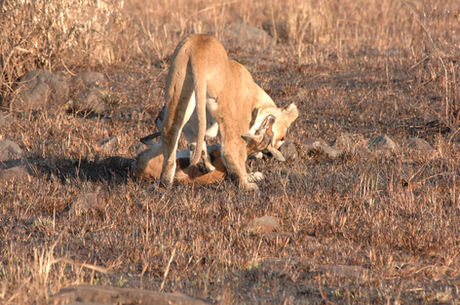
Africa In The Wild
I never knew of a morning in Africa when I woke up and was not happy. (Ernest Hemingway)
There is no greater thrill of memories and experiences than an African safari. My first morning began with learning the ways of the wild. The generators start at 5 a.m. sharp with the delivery of three cookies and coffee. I immediately jumped out of bed and into the shower. Instantaneously, I heard the door zipper open then close; I asked, “Who’s there?” Grabbing my towel, I gazed around the bathroom door and saw there were no cookies left. Peering hard into the twilight, I saw three monkeys enjoying my pre-breakfast treat. Life is either a daring adventure or nothing (Helen Keller). Welcome to Africa!
I agreed with my guide, “The only man I envy is the man that has not yet been to Africa for he has so much to look forward to.” Our safari centered around following the wildebeest migration from the Serengeti plains through Kenya. The primary areas traveled were Samburu, Lake Nakuru and the Masa Mara. The tribes of this area of Kenya are primarily nomadic cattle herders. There are formal schools for the children and surprisingly found most can speak English. They may have to walk long distances to go to school during migration; consequently, they walk in clusters. The terrain varied from flat plains to mountains with elevations from 930 ft to over 6,400 ft. The resulting temperatures ranged from high 40’s to mid 80’s during our quest.
Night time is a golden gift of sounds; the animals start their choir of the vocal harmony of Cappella groups. I simply sat back with a glass of wine and enjoyed the symphony. Following breakfast, we are back with camera in hand for the next adventure. The law of the jungle is real, very real. We watched a hyena pack hunt as a well-organized team of killers. Lions caught a baby giraffe; it took the mother three days to leave the site. The most electrifying event was the crossing of the wildebeest through the Masa Mara River. The crossing is so unique that only one in a thousand visitors see the actual crossing. This herd of almost three hundred thousand gathered on a bluff over forty feet above the river. Our guide told us they all go after the first is forced over the side of the cliff and that they did. The crocodiles were gargantuan and were swimming closer. I don’t think even Troy Landry of “Swamp People” would consider getting one of these in his boat.
Every day we were reminded to be in our camp before sunset because of the danger of poachers. It is miserable to know the animals are poached for meat, hides, tusk, etc. The African government is doing a much better job of protecting these beautiful animals, but the problem is limited resources and vastness. The protected preserves have no fences, so the animals migrate into dangerous areas where hunters are allowed. An African proverb, “Until the lion learns to write; every story will glorify the hunter.”

























